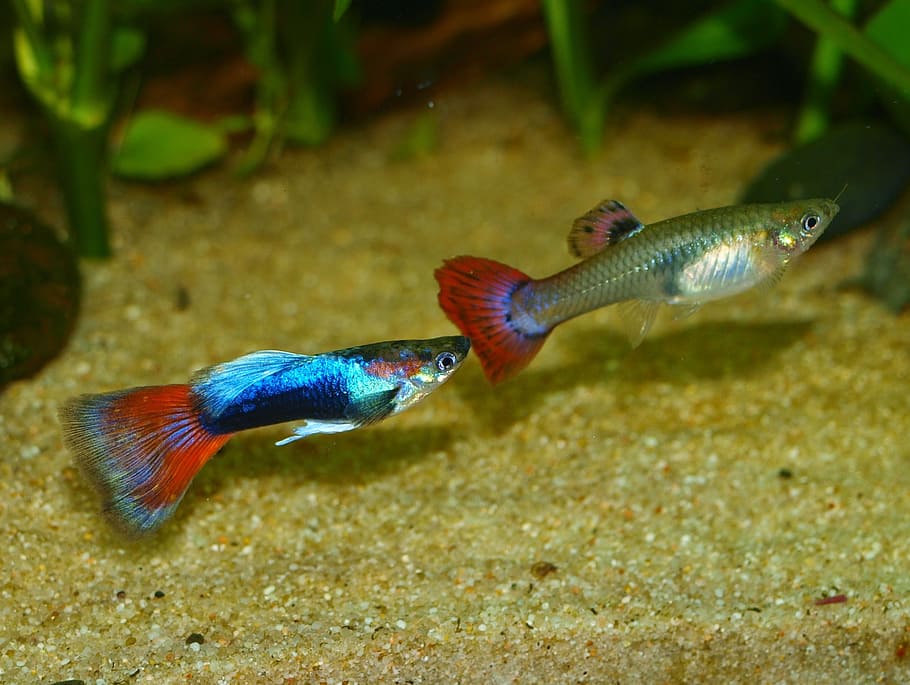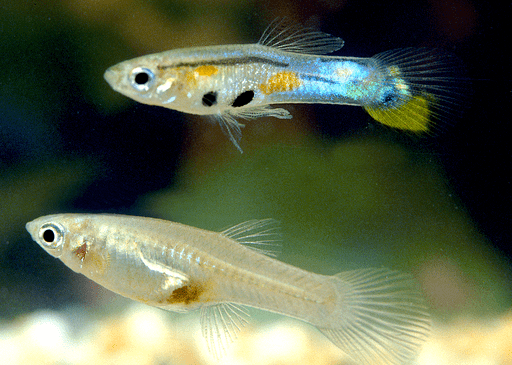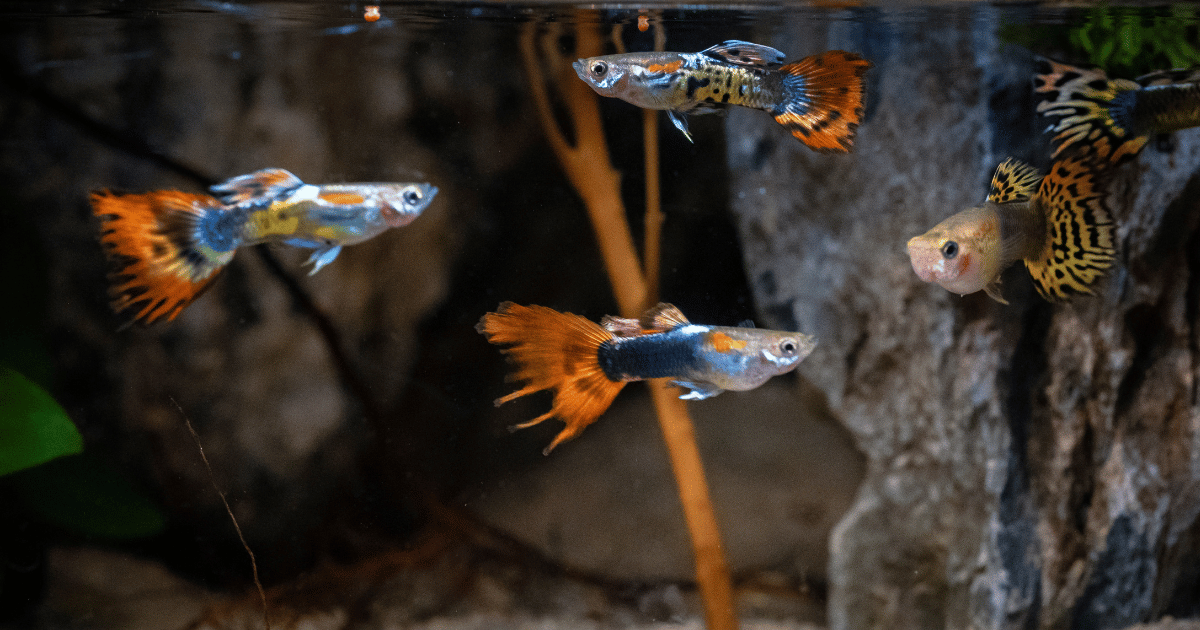Welcome to my guppy care guide!
If you’re wondering about these vibrant little creatures, let me enlighten you.
Guppies, scientifically known as Poecilia reticulata, are a species of tropical freshwater fish that hail from South America. They are renowned worldwide for their dynamic hues, diverse patterns, and the vivacious energy they bring to any aquarium.
They come in an array of dazzling colors, including blues, reds, yellows, and greens, making them a delightful addition to any home aquarium. From their delicate, flowing tails to their glistening, iridescent scales, guppies are truly a visual feast for the eyes.
 Why Choose Guppies as Pets
Why Choose Guppies as Pets
Now, you might be asking, “Why should I choose guppies as pets?”
For starters, guppies are notably hardy and adaptable, making them an ideal pick for both novice and seasoned aquarists. They can thrive in a variety of water conditions and are quite forgiving of occasional caretaking mishaps.
Guppies are also relatively easy to breed, providing an exciting opportunity for those interested in observing the wonders of aquatic life up close.
Moreover, guppies are peaceful and sociable creatures. They typically get along well with other non-aggressive fish species, making them an excellent choice for a community tank.
If you’re just dipping your toes into the world of aquatics, guppies are undeniably one of the best freshwater fish for beginners.
Their low maintenance needs, coupled with their captivating beauty, make guppies an irresistible choice for any fish enthusiast.
Whether you’re an aquarist in the making, a busy professional needing low-maintenance pets, or a parent wanting to introduce your kids to the responsibility of pet care, guppies are a fantastic choice.
So, if you’re ready to embark on this exciting journey of guppy care, let’s dive right in!
Basic Guppy Care
In the world of aquatic pets, guppies are a delight to nurture. Their vibrant colors and playful demeanor make them an excellent choice for enthusiasts of all levels. Let’s dive into the basics of guppy care, so you can create a haven for your guppies that simulates their natural habitat.
Tank Requirements
The first step in setting up a comfortable environment for your guppies is selecting the right tank. Unlike the vast oceans or flowing rivers, your guppies’ universe is confined to this little water world. Therefore, it’s crucial to provide ample space for them to swim and explore.
A 10-gallon tank works well for about 5 guppies. However, if you’re planning on having more guppies or introducing other freshwater fish like molly fish or neon tetras, then you may want to consider a larger tank. Remember, overcrowding can lead to stress and health issues among fish.
In addition to the size, the tank setup also plays a vital role in your guppies’ well-being. A well-aerated tank with gentle filtration, live plants, and hiding spots would definitely make your guppies’ life vibrant and vivacious.
Water Conditions
Just as we humans need clean, fresh air, guppies require clean, well-conditioned water to thrive. Your guppies’ water should be dechlorinated as chlorine can harm your little pals. Regular water changes – about 25% to 50% every week – will help maintain optimal water quality.
The pH level should ideally be between 6.8 and 7.8. It’s crucial to keep a check on the ammonia, nitrite, and nitrate levels in the tank. Any imbalance can lead to health complications for your fish.
Temperature Needs
Guppies are tropical fish and they thrive in warmer water. A temperature range between 72°F and 82°F (22°C – 28°C) is ideal for guppies. Investing in an aquarium heater and a thermometer can help regulate and monitor the temperature effectively. Sudden fluctuations in temperature can be stressful for guppies, so it’s crucial to maintain a stable environment.
Remember, while there’s a lot to consider, providing basic care for your guppies doesn’t have to be a daunting task. Just like other freshwater fish (be it betta fish, goldfish, or platy fish), guppies too, with a little attention and care, can flourish in a home aquarium. So, set the stage right for your aquatic buddies and watch them bring your tank to life!
Guppy Diet and Nutrition
Navigating the world of guppy care can seem daunting, but one of the most crucial aspects you need to understand is their diet and nutrition. Just like us, guppies thrive on a balanced diet, and maintaining this balance is key to keeping them happy and healthy.
Types of Food Guppies Eat
When it comes to the types of food that guppies can munch on, they’re not particularly picky eaters. However, providing them with a variety of foods does a world of wonders for their health.
Firstly, flake food is a staple in a guppy’s diet, much like the way bread is for us. It’s readily available in pet stores and comes in different types designed to suit the nutritional needs of specific fish, including our vibrant guppies.
Next, brine shrimp can be considered as a sort of delicacy in the guppy world. These tiny, nutritious crustaceans are an excellent source of protein and are especially beneficial for growing guppy fry.
Then we have bloodworms and daphnia, two more protein-packed options that guppies find irresistible. Just remember, these should be given as treats and not as the main course.
Lastly, guppies also appreciate a bit of green in their diet. Vegetable matter, such as cucumber slices or peas, can be a great addition to their regular food.
Feeding Frequency and Amounts
Now, how often and how much should we feed our guppies? Well, it’s recommended to feed guppies twice a day — once in the morning and once in the evening. Keeping a regular feeding schedule helps maintain their metabolism and overall health.
The amount of food should just be enough for them to consume within two minutes. Overfeeding guppies can lead to problems like obesity and tank pollution.
Remember, the goal is to meet their nutritional needs without going overboard. Providing a balanced diet will ensure your guppies are not just surviving, but thriving.
It’s worth mentioning that guppy care differs somewhat from the care of other freshwater fish. If you’re also interested in learning about the diets of other water-dwelling pets, you may want to check out my guides on betta fish care and neon tetra care.
Guppy Health and Disease Prevention
When it comes to our aquatic friends, their health is our top concern. Let’s dive into some common guppy diseases and how we can treat them. Also, we’ll explore some preventive measures to ensure our guppies lead a healthy and vibrant life.
Common Guppy Diseases and Treatments
Guppies, like any other pet, are not immune to illnesses. Some of the most common ailments that often afflict these small, lively fish include Fin Rot, Ich, and Fungal Infections.
Fin Rot often manifests as fraying or discolored fins. It is typically caused by poor water conditions and can be treated with commercially available anti-bacterial treatments.
Ich, also known as “white spot disease”, is another common ailment. It’s characterized by tiny white spots on the guppy’s body and fins. Treatment usually involves raising the tank temperature slightly and adding a commercially prepared medication.
Fungal Infections present as cotton-like growths on the guppy’s body. They can be treated with antifungal medications available at most pet stores.
| Disease | Symptoms | Treatment |
|---|---|---|
| Fin Rot | Fraying or discolored fins | Anti-bacterial treatments |
| Ich (white spot disease) | Tiny white spots on body and fins | Raise tank temperature, add medication |
| Fungal Infections | Cotton-like growths on body | Antifungal medication |
Preventive Measures
Prevention is always the best cure. Ensuring your guppies live in a clean, well-maintained tank can significantly reduce the occurrence of diseases. Regularly monitor your tank’s water conditions, temperature, and pH levels to keep them optimal for your guppies.
Feeding your guppies a balanced diet also plays a crucial role in their overall health. Overfeeding or underfeeding can lead to various health issues. Ensure your guppies get a varied diet that includes both dry and live foods.
Lastly, quarantine any new fish before adding them to your tank. This prevents any potential diseases from spreading to your existing guppies.
Remember, the key to a healthy guppy is consistent care and attention. By understanding potential threats, you can ensure your little aquatic companions live happy, healthy lives. Undoubtedly, guppies make some of the best freshwater fish for beginners due to their hardy nature and vibrant colors. But just like betta fish care or neon tetra care, guppies require a loving and attentive fish parent to thrive.
Guppy Breeding

Identifying Male and Female Guppies
Before we dive into the fascinating world of guppy breeding, we need to know how to distinguish between males and females. Identifying the sexes might seem like a daunting task, but fret not, it’s simpler than you think.
Male guppies are generally smaller but are gifted with vibrant hues and elaborate tails—nature’s way of impressing the ladies, I suppose! On the other hand, female guppies, while less flamboyant in color, are larger in size, with a plainer tail and a rounded abdomen. This stark contrast in appearance makes it relatively easy to differentiate between the two.
Breeding Process
The guppy breeding process is a captivating spectacle of nature that I have had the pleasure of witnessing several times. Male guppies court females by flaunting their colorful tails and performing a unique dance. If the female guppy is interested, she will allow the male to mate with her.
Guppies are livebearers, which means females give birth to fully formed, free-swimming fry, bypassing the egg stage that’s common in other popular freshwater fishes such as goldfish or neon tetras. The gestation period for guppies is typically around four weeks.
Caring for Guppy Fry
Caring for guppy fry, or baby guppies, is a task that requires utmost attention. To ensure their survival, you might want to isolate them from the adult guppies, as these tiny creatures are often at risk of being eaten. A separate breeding tank or a breeding box within the main tank should do the trick.
In terms of nutrition, guppy fry thrive on a diet of high-protein food like brine shrimp, micro worms, and specially formulated fry food. Frequent feeding, about four to five times a day, is necessary for their rapid growth.
Guppy fry also require the same optimal water conditions as their parents. Maintaining the right temperature, pH, and hardness levels is crucial for their survival and well-being.
And there you have it! The captivating world of guppy breeding is a rewarding endeavor that requires understanding, patience, and a keen eye for detail. Whether you’re a novice aquarist or a seasoned veteran, guppy breeding is an exciting addition to your fishkeeping journey.
Frequently Asked Questions About Guppy Care
Often, when it comes to fish keeping, a plethora of questions flood our minds. I’ve taken the liberty to answer some of the most common queries I’ve come across when it comes to guppy care.
How long do guppies live?
The lifespan of guppies is a topic that garners significant attention among aquarists. Under optimal conditions, these petite, vibrant creatures can live up to 2 to 3 years. However, their longevity largely depends on factors like diet, tank conditions, and preventive health measures. Providing them with a balanced diet, maintaining an ideal temperature, and ensuring clean water conditions can significantly extend their lifespan.
How many guppies can live in a tank?
The number of guppies you can comfortably house in a tank largely depends on the tank’s size and the guppies’ adult size. As a general rule of thumb, it’s recommended to provide 1-2 gallons of water per one inch of adult guppy. Hence, for a 20-gallon tank, you can comfortably house around 10-20 adult guppies. However, it’s crucial to bear in mind the need for sufficient swimming space and territories, especially for males, to prevent stress and aggression.
Do guppies need a filter?
I cannot emphasize enough the importance of a filter in a guppy tank. Guppies, like most freshwater fish, thrive in clean, stable water conditions. A filter aids in removing harmful substances from the water, like ammonia and nitrites, which are detrimental to guppies’ health. Additionally, a filter contributes to water movement, mimicking natural currents, which guppies enjoy.
If you are just getting started with aquariums, guppies are among the best freshwater fish for beginners. Their care is less complex when compared to betta fish care or goldfish care, but it’s essential to understand their specific needs to ensure their longevity and health. As always, remember that every fish species is unique and requires individualized care.
I hope these answers shed light on some of your guppy care queries, and you feel more equipped to provide a nurturing environment for your pet fish!

